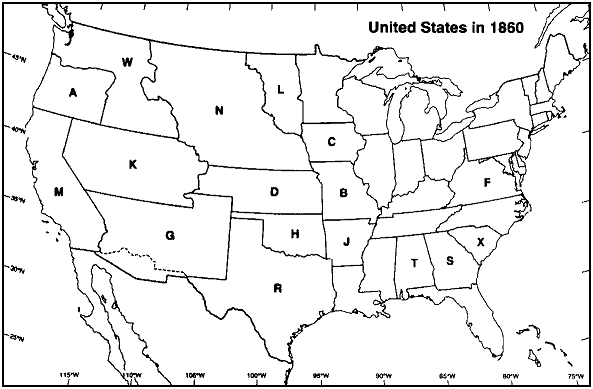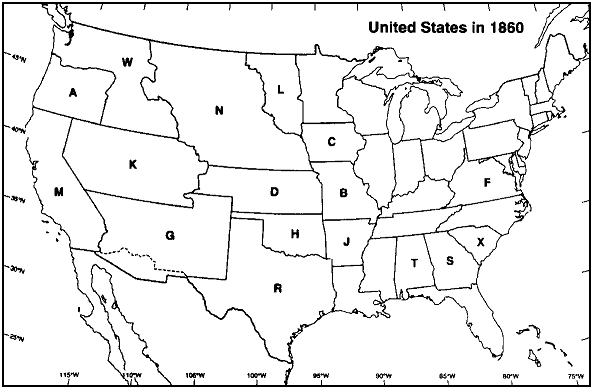Exam 14: From Compromise to Secession
Exam 1: Native Peoples of America72 Questions
Exam 2: The Rise of the Atlantic World131 Questions
Exam 3: The Emergence of Colonial Societies119 Questions
Exam 4: The Bonds of Empire106 Questions
Exam 5: Roads to Revolution112 Questions
Exam 6: Securing Independence, Defining Nationhood129 Questions
Exam 7: Launching the New Republic105 Questions
Exam 8: America at War and Peace113 Questions
Exam 9: The Transformation of American Society99 Questions
Exam 10: Democratic Politics, Religious Revival, and Reform106 Questions
Exam 11: Technology, Culture, and Everyday Life103 Questions
Exam 12: The Old South and Slavery105 Questions
Exam 13: Immigration, Expansion, and Sectional Conflict99 Questions
Exam 14: From Compromise to Secession108 Questions
Exam 15: Crucible of Freedom: Civil War129 Questions
Exam 16: Reconstruction and Resistance99 Questions
Exam 17: The Transformation of the Trans-Mississippi West110 Questions
Exam 18: The Rise of Industrial America92 Questions
Exam 19: Immigration, Urbanization, and Everyday Life91 Questions
Exam 20: Politics and Expansion in an Industrializing Age124 Questions
Exam 21: The Progressive Era122 Questions
Exam 22: Global Involvements and World War I105 Questions
Exam 23: Coping With Change101 Questions
Exam 24: The Great Depression and the New Deal107 Questions
Exam 25: Americans and a World in Crisis105 Questions
Exam 26: The Cold War Abroad and at Home121 Questions
Exam 27: America at Midcentury104 Questions
Exam 28: Liberalism, Civil Rights, and War in Vietnam126 Questions
Exam 29: A Time of Upheaval118 Questions
Exam 30: A Conservative Revival and the End of the Cold War156 Questions
Exam 31: A Changing Nation: Homefront Crises and New Global Realities101 Questions
Select questions type
Which statement best describes the Republican party position in the election of 1860?
(Multiple Choice)
5.0/5  (37)
(37)
Instructions: Identify the following. Be as specific as possible, and include names, dates, and relevant facts as appropriate. Be sure to explain the significance of the person or term.
Know-Nothing party
(Short Answer)
4.8/5  (31)
(31)
Why did the Fugitive Slave Act arouse strong emotions in both the North and the South? How did the act strike at the heart of the southern view of property rights and northern attitudes about the morality of slavery? Why did the act "radicalize" many conservative northerners on the slavery issue?
(Essay)
4.9/5  (37)
(37)
In the 1850s, the main issue that unified the otherwise diverse elements of the new Republican party was
(Multiple Choice)
4.9/5  (37)
(37)
MAP QUESTIONS
Instructions: Choose the letter on the accompanying map of the United States in 1860 that correctly identifies each of the following:
 Oregon
Oregon
(Short Answer)
4.8/5  (46)
(46)
Why did the Whig party collapse after the Kansas-Nebraska Act while the Democratic Party survived?
(Essay)
4.8/5  (31)
(31)
Instructions: Identify the following. Be as specific as possible, and include names, dates, and relevant facts as appropriate. Be sure to explain the significance of the person or term.
James Buchanan
(Short Answer)
4.8/5  (34)
(34)
Instructions: Identify the following. Be as specific as possible, and include names, dates, and relevant facts as appropriate. Be sure to explain the significance of the person or term.
Edmund Ruffin
(Essay)
4.8/5  (38)
(38)
MAP QUESTIONS
Instructions: Choose the letter on the accompanying map of the United States in 1860 that correctly identifies each of the following:
 Nebraska Territory
Nebraska Territory
(Short Answer)
4.9/5  (47)
(47)
Instructions: Identify the following. Be as specific as possible, and include names, dates, and relevant facts as appropriate. Be sure to explain the significance of the person or term.
Charles Sumner and Preston Brooks
(Essay)
4.8/5  (38)
(38)
Instructions: Identify the following. Be as specific as possible, and include names, dates, and relevant facts as appropriate. Be sure to explain the significance of the person or term.
Lecompton and Topeka governments
(Essay)
4.7/5  (45)
(45)
Instructions: Identify the following. Be as specific as possible, and include names, dates, and relevant facts as appropriate. Be sure to explain the significance of the person or term.
Doctrine of free soil, Popular Sovereignty
(Essay)
4.7/5  (32)
(32)
Instructions: Identify the following. Be as specific as possible, and include names, dates, and relevant facts as appropriate. Be sure to explain the significance of the person or term.
Conscience Whigs
(Short Answer)
4.8/5  (39)
(39)
What was the reaction of many northerners to the 1850 Fugitive Slave Act?
(Multiple Choice)
4.8/5  (33)
(33)
Describe the debate surrounding Harriet Beecher Stowe's Uncle Tom's Cabin . What did she describe in her novel? Why did it cause such a national controversy? How did the South react to it?
(Essay)
4.8/5  (41)
(41)
Why did southerners conclude that the North was bent on extinguishing slavery in southern states?
(Short Answer)
4.8/5  (32)
(32)
Instructions: Identify the following. Be as specific as possible, and include names, dates, and relevant facts as appropriate. Be sure to explain the significance of the person or term.
Lecompton Constitution
(Essay)
4.9/5  (36)
(36)
Examine the 1860 presidential election. Who were the major candidates, and what were their main positions? Why did Abraham Lincoln ultimately win?
(Essay)
4.9/5  (42)
(42)
Showing 61 - 80 of 108
Filters
- Essay(0)
- Multiple Choice(0)
- Short Answer(0)
- True False(0)
- Matching(0)